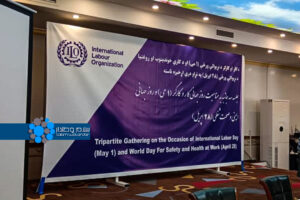KABUIL (SW) – A number of pregnant women and those who have just given birth say their access to health services has dwindled under the rule of the Islamic Emirate.
Fatema, a pregnant woman who doesn’t know exactly how many months old the baby inside her womb is, complained about the lack of access to health services to check the state of her pregnancy. She, who has four other children, had the amount of suffering and pain visible on her face. She said does not know when she got pregnant.
She told Salam Watandar that she is struggling to feed her four children as she is going to be a mother for the fifth time. “My economic situation is not good, we have many problems. I am very sick myself, I have homework, there is no government hospital where I can go. We are poor people, my husband is a labourer.”
Rubina Ahmadi, another pregnant woman who also complained about the lack of access to health services, said that there is no complete and free health center in the country that can fully treat pregnant women. According to her, pregnant women need to be under regular health care during pregnancy, and their health status should be examined at least once a month.”The problem is that many health centers that exist in Kabul and in some places have no specialized doctors at all. The second problem is that there are no medicines and sanitary materials”.
Satish is a mother who recently gave birth in one of the government hospitals in Kabul. She has just been discharged from the hospital, and her family was hard-pressed to convince her to share her views.
She was happy to give birth to her daughter, but she complained about the lack of health services and the behavior of the doctors and nurses in the government hospitals in Kabul. “It is called as the public hospital, but there is no serious attention to patients. The mother and the baby are not taken care of. Even the medicine is not available for free”, she said.
Not only pregnant women and mothers who have just given birth complain about the lack of health services, but there are other girls and women whose health problems are not taken care of properly. They accuse private medical centers of being too expensive and government centers of neglect and misbehavior.
A number of women interviewed by Salam Watandar also complained about the lack of a single and regular umbrella to organize health work for women, and said that there is no institution in Afghanistan to help them.
According to them, in the past, teenage and young girls received anti-tetanus vaccine and blood strengthening tablets (folic acid) through their schools, but after closing the schools to girls above the sixth grade, no structure has been created for the campaign to implement vaccines and blood-enhancing drugs, and this health vacuum is also clearly visible in the lives of girls.
A Kabul resident, Nadia said in this regard that since the new government of the Islamic Emirate, the health services for women and girls are non-existent. “In the past, vaccinators came to help and tetanus vaccines were administered in clinics, but no more.”
Meanwhile, the officials of the Doctors Without Borders (MSF) organization in Afghanistan also report the reduction of health services for women under the Islamic Emirate.
Abdul Qayyum Popel, the deputy coordinator of the medical department of the MSF in Afghanistan, told Salam Watandar that the Islamic Emirate’s restrictions on female doctors is another factor in reducing women’s access to health services.
“The ladies who work in private hospitals are afraid to carry out their duties. Every day, certain restrictions are imposed on women and the number of female health personnel in Afghanistan is low. In government hospitals, the number of patients has increased, one of the problems they have is the lack of female personnel. The number of medicines and those who are experts are few”.
A number of female physicians also confirmed the decrease in women’s access to health services and say that working conditions have become difficult for all health personnel in the country, especially women.
Fatema, a gynaecologist at one of the private hospitals in Kabul, said: “First of all, doctors’ salaries have decreased, the conditions for doctors have deteriorated, especially for doctors who used to go and work in the provinces. Currently, they cannot travel to the provinces and listen to women’s problems. We used to work freely, we used to talk freely with the sick patients; But now a man is not allowed to come to us for their female patients.”
Muzhgan, another doctor in this private hospital said that with the cut in international aid and the lack of medical equipment, Afghanistan’s hospitals are facing a dire situation.
In the same way, Fatema Najmir, a female doctor said there is no hope for help from the outside. “In the past, women were given training and some programs and workshops were considered to raise the scientific level of newly graduated doctors, but there is no hope for that anymore. ”
We wanted to have the response of the officials of the Ministry of Public Health in connection with women’s access to health services, but repeated calls were not ansered.
ENDS






